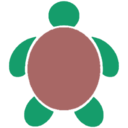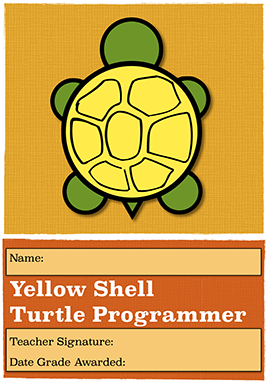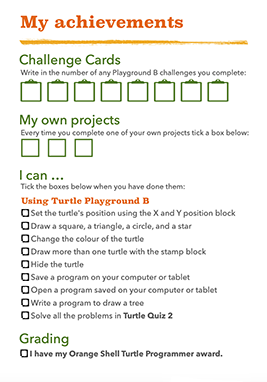
Turtle Programming

Turtle Programming
The Turtle Blockly playgrounds provide a resource for teaching programming concepts in KS1, KS2 and KS3.
Blockly playgrounds are the best way to prepare for Raspberry Pi's Coding Challenge.
Each playground provides a few more programing tools than the one before. This makes moving on to later playgrounds for children simple, intuitive and accessible.
The White Turtle Playground is for the youngest pupils, those who have never written programs at all and have only ever used a floor robot such as Bee-bot. Programs are written by dragging and linking code blocks into the workspace and then pressing Run
After a few floor robot lessons (e.g. using a Bee-bot), Year 1 pupils start with the White Turtle Playground and the White Shell Challenge Cards. At some point, some children may achieve their Yellow Shell award and go on to the next playground and challenge cards. There are plenty of extensions built in to the scheme if the teacher decides to save the Yellow Shell challenges until Year 2. In the following years, the average pupil will probably progress at one grade per year meaning that at Year 6 they will achieve their Blue Shell Turtle Programmer award. They will miss out on the Brown Shell award, where an interesting introduction to robots and sensors is studeied, and the Red Shell award, which introduces lists. Neither of these is essential to learn about in KS2. These two topics do not appear in KS2 but it can be helpful to understand about lists if taking part in the Computing Challenge in KS3.
Pupils aged 10 to 13, who gain their Black Shell award will have earned it!
Children learning to program with Blockly Turtle need to be provided with the following:
White Shell pupils (Year 1) Playground: Turtle Playground - White
Learning Aims: Transfer children from floor robots; introduce programming with code blocks
Concept Focus: Sequence
Teaching resources: WhiteShellChallengeCards.pdf | WhiteShellGradeCard.pdf | White Quiz
Answers: WhiteShellCardsAnswers.pdf
Yellow Shell pupilsPlayground: Turtle Playground - Yellow
Learning Aims: Learn how to move and drawing with the turtle; learn how to save programs
Concept Focus: Sequence, Decomposition
Teaching resources: YellowShellChallengeCards.pdf | YellowShellGradeCard.pdf | Yellow Quiz
Answers: YellowShellCardsAnswers.pdf
Orange Shell pupilsPlayground: Turtle Playground - Orange
Learning Aims: Learn how to write programs with loops
Concept Focus: Decomposition, Iteration, Repetition
Teaching resources: OrangeShellChallengeCards.pdf | OrangeShellGradeCard.pdf | Orange Quiz
Answers: OrangeShellCardsAnswers.pdf
Green Shell pupilsPlayground: Turtle Playground - Green
Learning Aims: Introducing text and variables; Learn how to get user input
Concept Focus: Text manipulation, Input and output, Variables
Teaching resources: GreenShellChallengeCards.pdf | GreenShellGradeCard.pdf | Green Quiz
Answers: GreenShellCardsAnswers.pdf
Purple Shell pupilsPlayground: Turtle Playground - Purple
Learning Aims: Learn how to program with numbers; Use logic and while loops
Concept Focus: Logic, Numbers, Variables
Teaching resources: PurpleShellChallengeCards.pdf | PurpleShellGradeCard.pdf | Purple Quiz
Answers: PurpleShellCardsAnswers.pdf
Blue Shell pupilsPlayground: Turtle Playground - Blue
Learning Aims: Introduce functions
Concept Focus: Iteration, Abstraction
Teaching resources: BlueShellChallengeCards.pdf | BlueShellGradeCard.pdf | Blue Quiz
Answers: BlueShellCardsAnswers.pdf
Brown Shell pupilsPlayground: Turtle Playground - Brown
Learning Aims: Introduce simple robotics
Concept Focus: Detecting environment, Selection
Teaching resources: BrownShellChallengeCards.pdf | BrownShellGradeCard.pdf | (No quiz for this level)
Answers: BrownShellCardsAnswers.pdf
Red Shell pupilsPlayground: Turtle Playground - Red
Learning Aims: Learn to use lists in more complex programs
Concept Focus: Data types, List manipulation
Teaching resources: RedShellChallengeCards.pdf | RedShellGradeCard.pdf | Red Quiz
Answers: RedShellCardsAnswers.pdf
Black Shell pupilsPlayground: Turtle Playground - Black
Learning Aims: Make available a full set of Blockly blocks
Concept Focus: Advanced programming now possible.
Teaching resources: BlackShellChallengeCard.pdf | BlackShellGradeCard.pdf
Oxford Turtle System Direct link: https://www.turtle.ox.ac.uk/run
Direct link: https://www.turtle.ox.ac.uk/run
Purpose: introduce text based programming including Python
Concept Focus: see Documentation
Challenge cards are available for each playground. The challenge cards can be downloaded from the resources section above, guillotined and laminated.
Notes:
The quizzes for each award that has a quiz are linked to above. Pupils can attempt these whenever they or their teacher thinks they are ready. Teachers should point pupils to the Quizzes tab at the top of this website, to access the relevant quiz for their level.
AwardsAll children start their journey as White Shell programmers. The most accomplished may become Black Shell programmers. To achieve the next Turtle Shell Grade a pupil must have:
Note that the pupils can attempt any of the above tasks as many times as they wish, including the Quiz.
Children's Grade CardsA progress chart for pupils at each grade is available from the Resources section above. Children can take these with them through their Turtle adventures. In it they record their achievements and the Turtle Programming Grades they have obtained.
Example Grade Card:
 |
 |
| front | back |
How long should it take my pupils to achieve each Turtle Shell Award?
The Turtle Playgrounds are a way of providing a progressive backbone of programming techniques and computational thinking skills to pupils in KS1, 2 and 3. They are not intended to be the only programming or Computer Science taught. Some of the concepts in the later Grade Cards are quite difficult and usually reserved for secondary students but they should become accessible for many KS2 pupils because of the use of blocks instead of text-based programming, and because of the limited and familiar context of moving a turtle around a screen. Therefore, an average pupil will probably be awarded one grade each academic year. Nevertheless, enthusiastic children may ask to go faster and the system should enable teachers to manage this, if appropriate.
Do the pupil's own programs need to make use of the new blocks introduced?
No.
Each Grade card has a few spaces for pupils to record when they have made something that they want to make. The pupils' programs will probably get more interesting as they become more skilled programmers but it is purely an opportunity to be creative.
Why are the Challenge cards not linked to on the Playground pages?
If we had made the cards available to the pupils in this way, it would have made the children think they have to do them all. It would take away control from the teacher. It is the author's belief that, although many online guided tutorials try and find a learning route for individual children based on what they have done previously, a teacher can do a better job! For example, a teacher can spot when a pupil is getting frustrated or is just not having a great day and, knowing that pupil, they can suggest that they leave a particular challenge, and do a different one, one which they know other children have particularly enjoyed, or suggest the maze challenge, or suggest they carry on with one of their own turtle projects, etc. A teacher might notice another child is finding the challenges easy but does not want to miss out on being awarded a Turtle Grade. The teacher can then guide that child to do the minimum number of challenges necessary to obtain the grade they are working on. Publishing the Challenge Cards to pupils takes away this opportunity from the teacher to provide the best learning experience for their pupils.
Why don't the videos at the bottom of the playgrounds do more teaching / show more examples?
The author believes that the best learnt lessons are those that are discovered by the children themselves. The videos are to introduce how the new code blocks work and might be used. They are not intended to show how to write the programs to solve the Challenge Cards. Some cards in more difficult topics do provide some explanations. Children may also help each other – to the benefit of all.
Do the quizzes have to be done under exam conditions?
No. These are can-do challenges. However, all questions/tasks have to be marked correct to get a tick in the grade card.
Why are the challenges produced as cards and not more gamified?
A deliberate choice was made to not turn this into a series of games. So many learning materials online do this that there is a danger that children think Computer Science is only about games. Other subjects ask pupils to learn and the author thinks that we should not be afraid of doing so in Computer Science either. There are a number of hooks in the system that should help pupils develop a love of learning. For example, it is expected that when pupils get a particular grade and are directed to a new playground, the first thing they are going to be excited to do is look through the blocks to find out which new ones they are going to learning about. By not gamifying the system we have made playgrounds that can be used creatively for projects other than just working through the challenge cards. Finally, and perhaps most importantly, by not gamifying the system it is hoped that children will learn that there is more than one solution to many tasks.
What are the Maze Puzzles for?
There is one Maze puzzle at the bottom of each playground. These are intended to be a fun change of activity for the children. They also make sure that the children are used to the slightly different blocks used in mazes because, in the earlier playgrounds, maze based questions are the most effective way of assessing skills in the quizzes. The maze puzzles also sneak in some more Computational Thinking practice for the children.
Turtle Playgrounds author and designer: Chris Roffey
Programmer: Dave Oostendorp
Hosting: The Cuttle Platform
Sponsors: Hertford College, Eljakim IT and Cuttle bv
Turtle Playgrounds correspondence: Chris Roffey chris@codingclub.co.uk
Oxford Turtle System: Prof. Peter Millican peter.millican@hertford.ox.ac.uk
